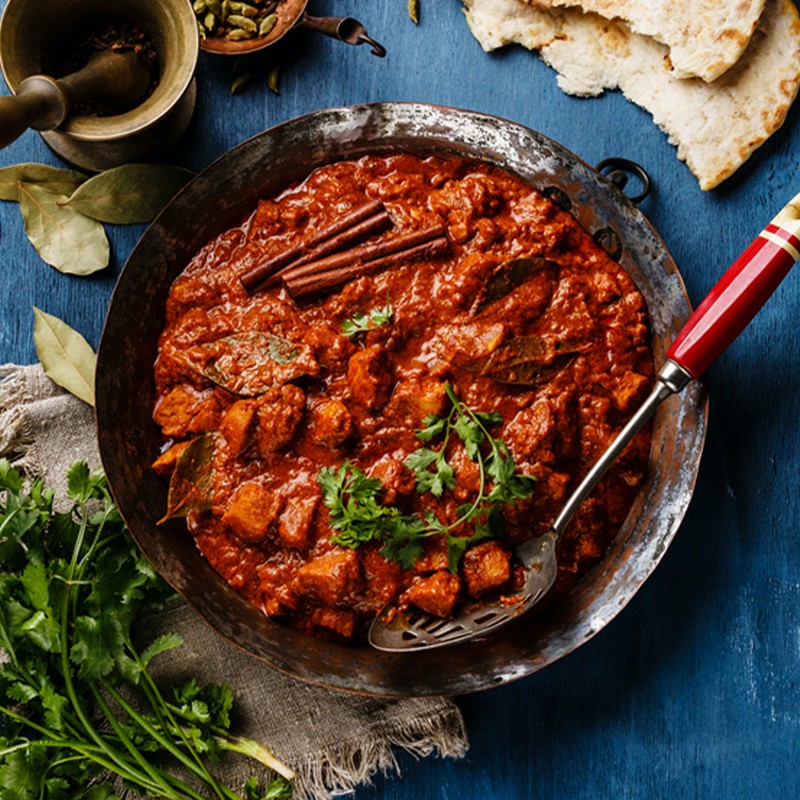8 Easy Curry Recipes To Try This Month

Vivek Singh
Chef / Owner Of The Cinnamon Club & Cinnamon Kitchen
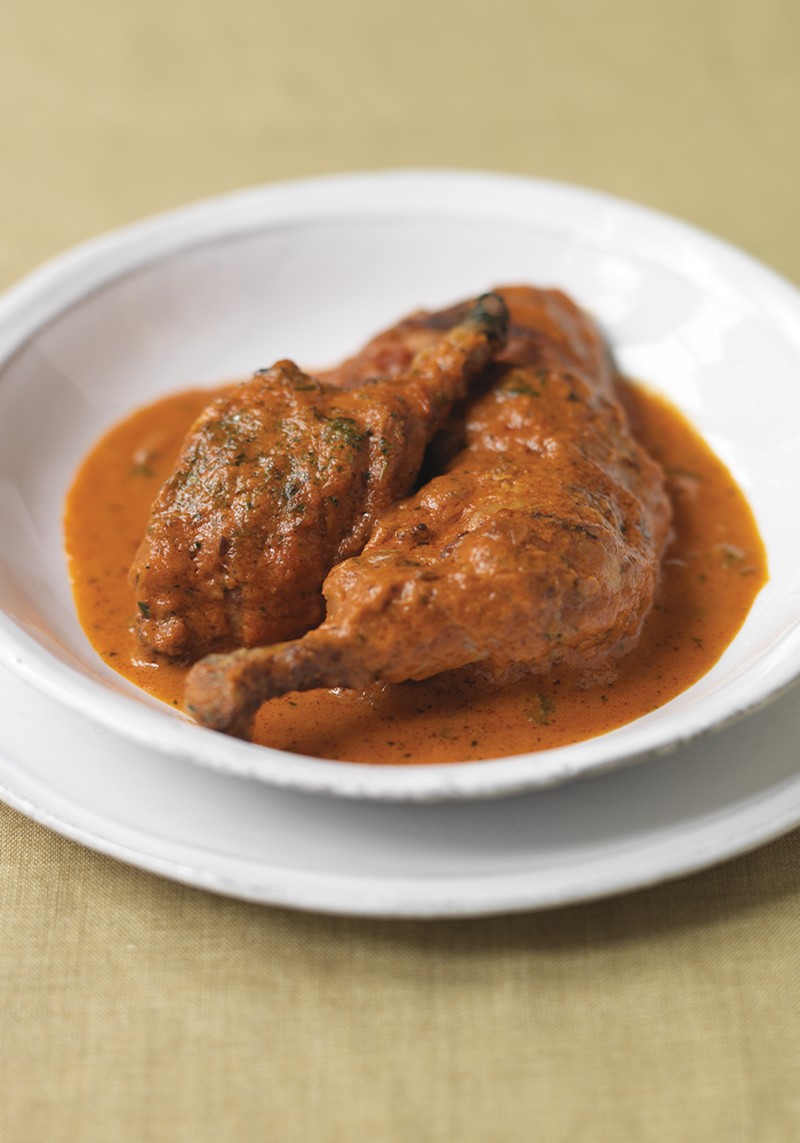
Murg Mussalam – Old Delhi-Style Chicken Curry
Great for grand celebrations, this is the king of Indian dishes. My version makes it even more interesting by using raw rice in the cavity of the chicken, which cooks at the same time as the bird.
Boil the egg, chill in iced water, peel and keep aside.
Marinate the chicken with all the other ingredients and massage carefully between the skin and the flesh and inside the cavity of the chicken to spread the spices as much as possible. Leave aside to marinate for 30 minutes. Reserve the excess marinade and keep.
Mix together the raw rice and other spices and bind with just enough marinade as may be necessary to bring the rice together.
Now take the chicken and fill a third of the cavity with the spiced rice, place the egg in the centre of the cavity and fill the rest of the cavity with more rice. Position the chicken on a baking tray; you may use strips of aluminium foil to keep the chicken in shape and its place.
Preheat the oven to 200ºC and place the tray in the centre of the oven and cook for 40-45 minutes covered with tin foil, basting after every 20 minutes. Remove the foil and cook another 15-20 minutes uncovered.
The skin should be golden and crisped up when ready – if you think it needs some more colour then finish under the grill for 2-3 minutes. The rice inside the cavity should be cooked by the time the chicken is ready. Remove from the oven and rest for 20 minutes.
Meanwhile collect the juices and excess marinade and bring to a boil, emulsify using cream, correct seasoning and finish the sauce with fresh coriander.
Sprinkle with chaat masala and serve the whole bird at the table with the sauce separately to pour over.
Serve with biryani rice or pilau on the side.
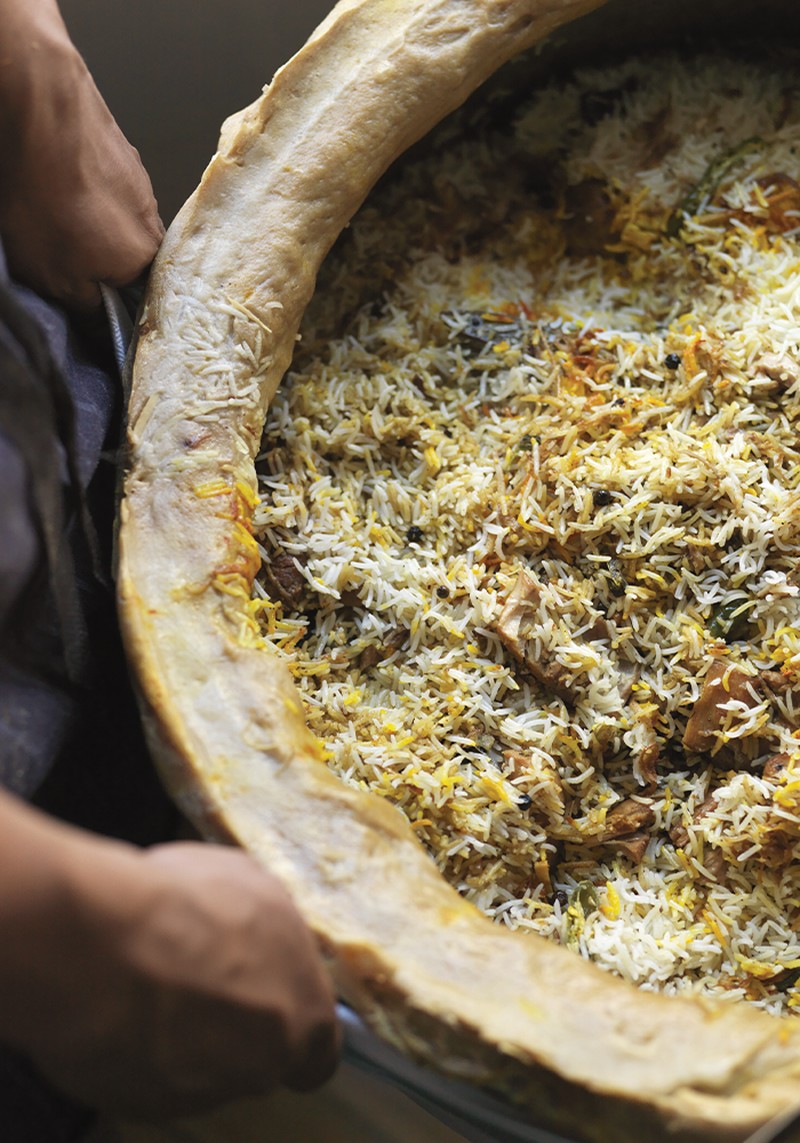
Hyderabadi-Style Biryani of Chicken
Often referred to as ‘black magic’, most cooks find it bewildering that raw meat can be layered with partially cooked rice in a pot and cooked with a closed lid – and still result in a dish where the meat cooks just right and the rice is fluffy and not overcooked. Cooking with a sealed pot with no visibility requires a deep connection to the ingredients and a leap of faith! Even though I have been making biryanis for over 25 years, I still get butterflies waiting for the pot to be opened to see how it’s turned out.
Marinate the chicken using all the ingredients for the marinade and set aside for 30 minutes – or for even better results, 3-4 hours.
Wash and soak the basmati for 30 minutes.
In a pan, boil the water with the salt and whole spices. Once boiling rigorously, add the strained rice and boil for 10-12 minutes, or until the rice is half cooked. This is very important.
While the rice is boiling, place the marinated meat in a broad thick-bottomed casserole dish or pot with a lid.
Warm the milk in a separate pan and soak the saffron.
Strain the half-boiled rice and layer it on top of the meat. Sprinkle the ghee and soaked saffron on the rice. Cover the casserole with a lid and seal the sides with foil, leaving a small gap for steam to escape.
Put the casserole on a high heat for 8-10 minutes. Once you see steam through the gap, lower the heat and cook the biryani for about 20-25 minutes.
Leave the casserole to rest for 5 minutes before serving.
The aromatic biryani is best accompanied by yogurt raita.
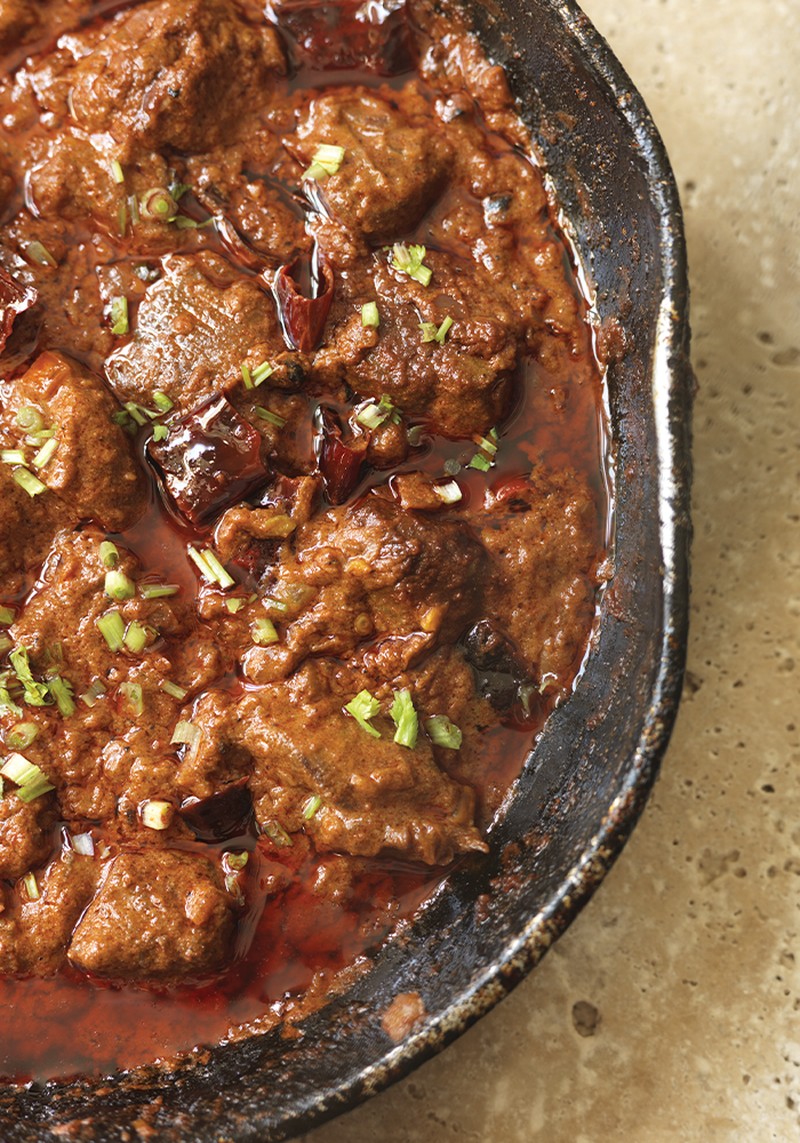
Fiery Rajasthani Lamb Curry
As the name suggests, this is a very hot dish – not for weak constitutions. It’s one of the few Indian dishes that contains heat in both senses – it’s 'chilli hot' and 'spice hot'. But you can choose the amount of heat you'd like: discard most of the seeds from the chillies if you want to reduce the heat, or keep them in if you want it really hot.
Set aside 3 or 4 of the dried chillies to use later; put the remainder to soak in 125ml of water. Also put aside 4-6 of the cloves and 1 tablespoon of the ghee. Mix the yogurt with the cumin seeds, ground coriander, chilli powder and salt in a bowl. Set aside.
Heat the rest of the ghee in a heavy-bottomed pan. Add the remaining cloves, the cinnamon leaves and the green and black cardamoms. When they begin to crackle and change colour, add the garlic. Sauté for 2 minutes or until the garlic begins to turn golden.
Add the onions and cook for 10 minutes or until golden brown, stirring constantly. Stir in the meat and cook for 2-3 minutes. Drain the red chillies and add to the pan.
Continue cooking for 10-12 minutes or until the liquid has evaporated and the meat starts to brown. Now add the spiced yogurt and cook for another 10-12 minutes or until the liquid from the yogurt has evaporated.
Add the stock or water and bring to the boil, then cover the pan, reduce the heat and simmer until the meat is tender. Check the seasoning. Remove from the heat and keep warm.
To prepare the tadka, or tempering, which boosts the flavours, heat up the reserved ghee or oil in a large ladle over a flame (or in a small pan) and add the reserved cloves and dried red chillies.
Cook for 1-2 minutes or until the ghee changes colour and the spice flavours are released. Pour the contents of the ladle over the lamb curry, sprinkle with the chopped coriander and serve.
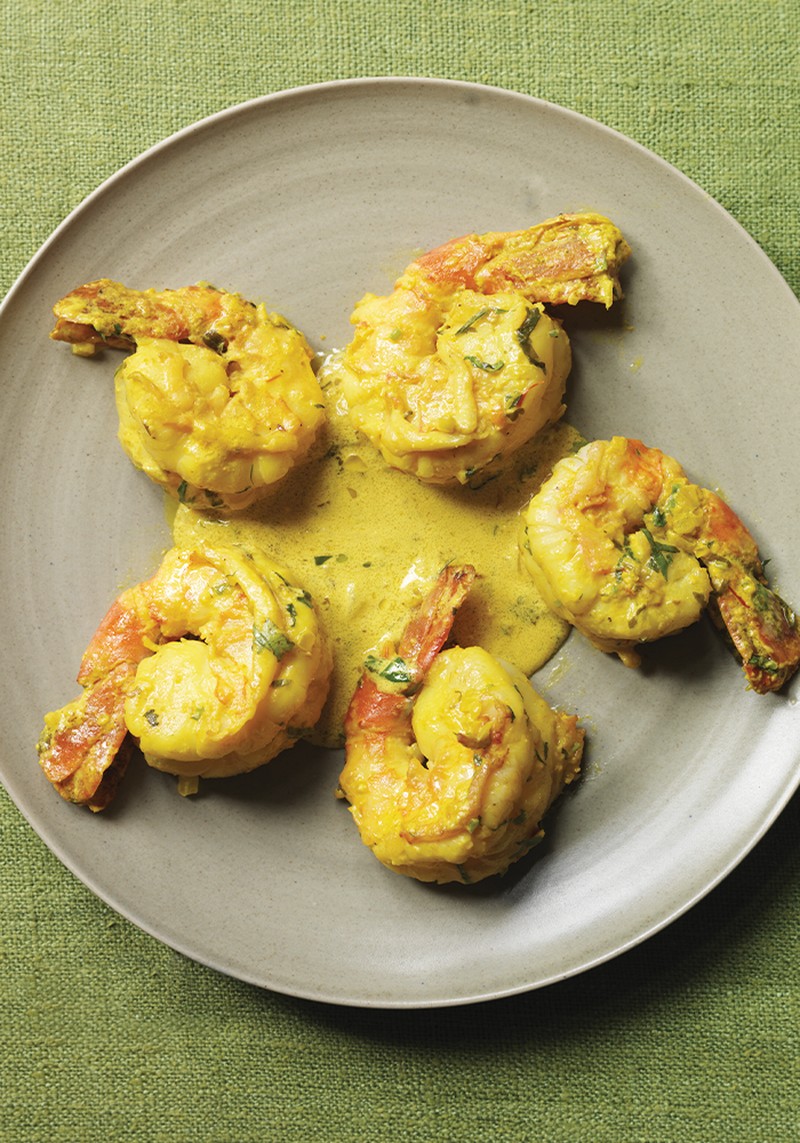
King Prawns In Saffron Almond Sauce
Originally referred to as jhinga nisha, this prawn curry is mild, aromatic and fragrant. Containing cardamom, almond paste and saffron, the sauce is luxuriously rich and silky. Fit for feasts, this is one of the finest examples of Mughlai cooking.
Peel the prawns, leaving the tail shell intact, then de-vein them by making a shallow cut along the back and lifting out the dark intestinal vein with the point of a sharp knife. Place the prawns in a bowl, mix in all the ingredients for the first marinade and set aside for 10 minutes.
Heat the oil in a large, heavy-based frying pan, add the prawns and sear quickly so they curl up. Remove from the heat immediately and set aside to cool.
For the sauce, put the almonds and cashew nuts in a pan, add enough water to cover and bring to the boil. Simmer until soft and then drain. Blend to a smooth paste with a little water in a food processor or blender.
Heat the ghee or clarified butter in a heavy-based pan, add the bay leaf, crushed cardamom and onion, and sauté until the onion is golden. Add the ginger and green chilli and sauté for 1 minute, then add the turmeric and sauté for about a minute longer, until everything becomes bright yellow. Add the almond and cashew paste and cook, stirring frequently for 3-5 minutes. Add the fish stock or water and simmer for 2-3 minutes, until the sauce turns glossy. Stir in the saffron infusion and cook for 1 minute. Stir in the salt and sugar, followed by the cream and garam masala. If the sauce is too thick, dilute it with a little more fish stock or water. Remove from the heat and keep warm.
Mix together all of the ingredients for the second marinade and dip the prawns in it. Thread the prawns through the bamboo skewers, piercing the skewer through the tail of each prawn and taking it out through the tip of the head. Cook for 5-6 minutes in an oven preheated to 200ºC. Divide the sauce between 4 serving plates. Remove the prawns from the skewers, place on top of the sauce and serve.
Visit CinnamonClub.com

Dipna Anand
Chef/Owner Of Dipna Anand At Somerset House
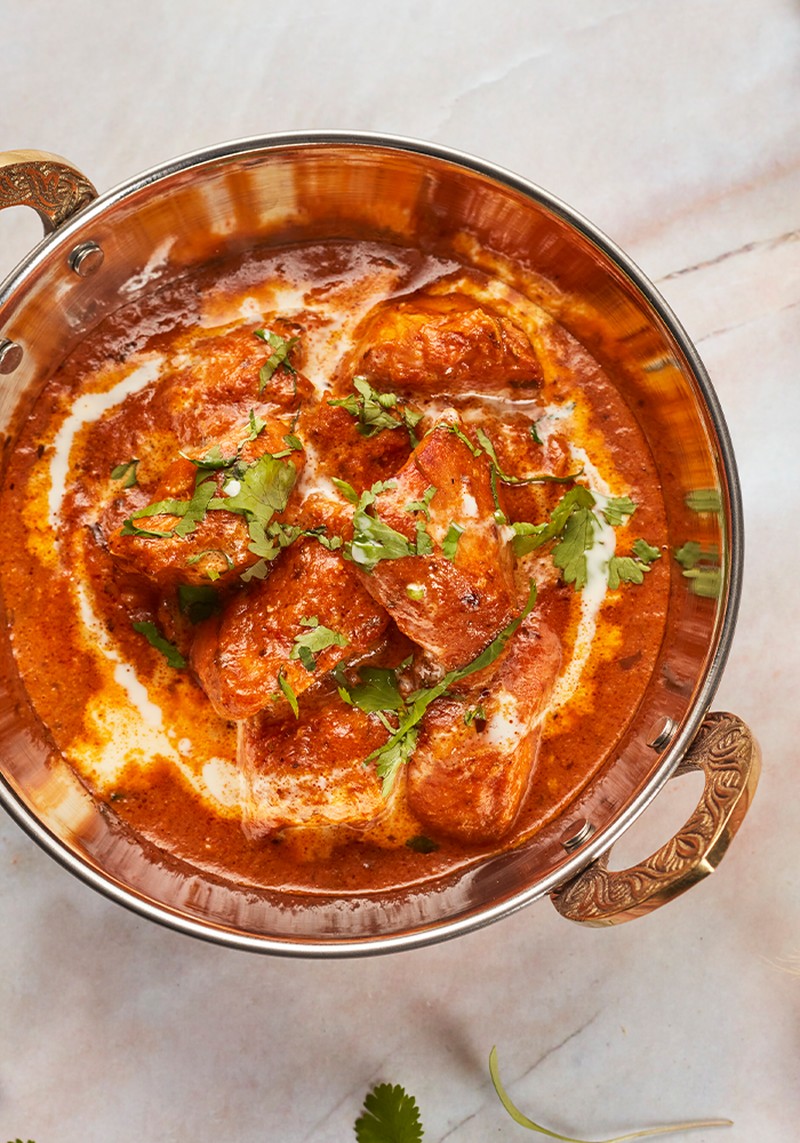
South Indian Chicken Curry
Peel ginger, trim green chillis and blend to a paste with garlic. Trim green chillis, blend to a paste. Peel and dice the onions. Blend the tomatoes. Crush the ajwan seeds with the back of a spoon. Toast the desiccated coconut until light golden brown. Dice the chicken thighs into 2.5cm pieces.
Heat the oil in a pan on a medium heat, then add the cumin and mustard seeds, sizzle for 2 minutes, then add the curry leaves.
Add the onions and cook for 4-5 minutes until caramelised. Add the chilli, ginger and garlic paste, then cook for another minute.
Add the blended tomatoes, turmeric, chilli powder, ground cumin, ghee butter and salt, mix well, then cover and cook for 3-4 minutes, stirring every minute.
Once the masala splits at the edge, add the chicken and coat well in the sauce, cooking for 3-4 minutes.
Add the water and bring back to boil. Add the crushed ajwan seeds, coconut milk, dried fenugreek leaves and garam masala. Roughly chop the coriander, add to the masala, then mix well. Cook for 5-6 more minutes, then serve.
Visit DipnaSomersetHouse.co.uk

Rohit Ghai
Chef/ Owner Of Kutir + Manthan
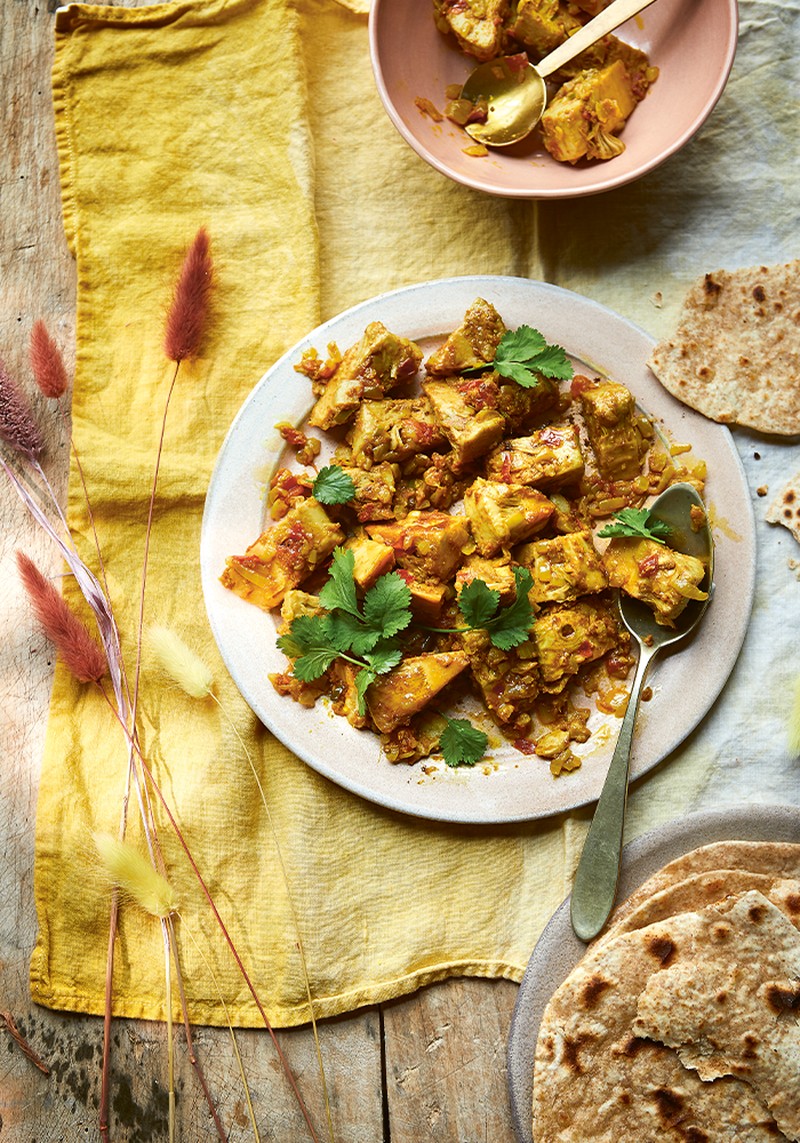
Jackfruit Masala
Jackfruit is a truly versatile vegetable, with a wonderful flavour and texture. It’s sometimes known as ‘vegetarian meat’ because it contains lots of fibre. This jackfruit masala is simple and delicious.
If using tinned jackfruit, wash it under running cold water and leave it in a colander. If you are using raw whole jackfruit, first grease your fingers well with vegetable or rapeseed oil, or mustard oil if you have it.
Place a bowl of oil next to you while cutting the jackfruit, as you will need to smear your palms with oil from time to time – the oil prevents the jackfruit fibres from sticking to your hand. With a sharp knife, remove the skin of the jackfruit and cut out any thick stem in the centre. Cut the jackfruit into small pieces. Don’t wash it.
Heat the oil in a frying pan over a medium heat. Once it starts smoking, add the jackfruit in small batches and shallow-fry until light brown. Remove from the pan, place in a colander and set aside.
Add the onions to the pan and fry until golden brown. Add the ginger/garlic paste and cook for 4-5 minutes, until the raw aroma disappears, then add the turmeric, red chilli powder, dried mango powder, ground coriander and a pinch of salt. Add the tomatoes, green chillies and ginger and cook until the oil separates. This usually takes 5-10 minutes over a low heat.
Add the jackfruit and stir to coat the pieces evenly with the spice mix. Cover with a lid and let the mixture cook over a low heat for 3-4 minutes, stirring occasionally. During this time the jackfruit pieces absorb the flavour of the spices and the sauce should become dry. Sprinkle with the garam masala and scatter over the coriander leaves. Serve with chapatis.
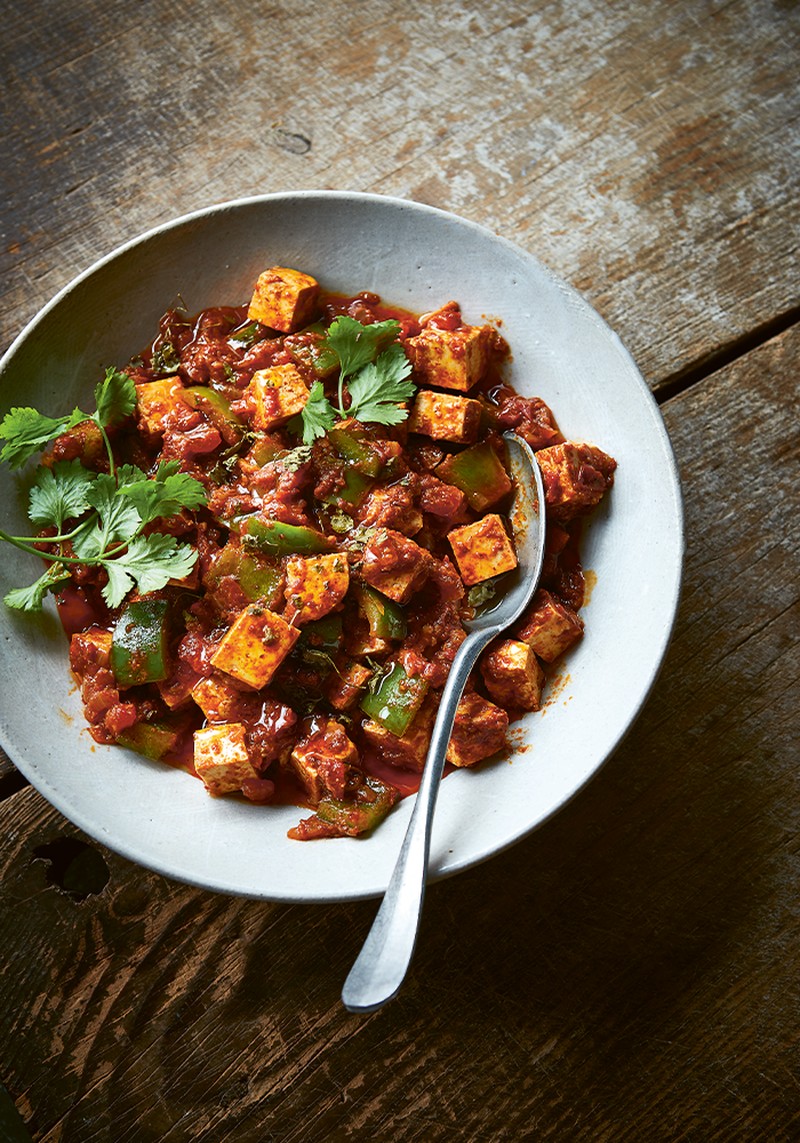
Kadai Tofu
Kadai dishes are very popular in India. This one’s all about the spice mix, which is made with coriander seeds, whole red chillies, cumin seeds, fennel seeds and black pepper. If you don’t have a kadai, you can use a wok or any other pan.
First, make the masala. In a small pan, dry roast the spices for 3-4 minutes on a medium heat until fragrant. Remove from the heat and allow to cool slightly, then grind half to a fine powder and leave the other half coarse. Set both aside.
Heat the oil in a pan that you can subsequently cover with a lid and add the coarse masala. Stir, then add the onions and sauté until golden brown. Add the green chilli and the ginger/garlic paste and sauté for a further 1-2 minutes.
Add the tomatoes and tomato puree, stir, then cook for around 6 minutes until the tomatoes are really soft. Add 3-4 teaspoons of the fine masala (or add all of it if you like it spicy). Stir in the garam masala and Kashmiri chilli powder.
Add half the julienned ginger, cook for 30 seconds, then stir in 120ml of water. Add the soya cream (if using) and salt and mix well. Cook for 1 minute.
Add the tofu and green pepper and mix well. Cover the pan with a lid and cook for 5-6 minutes on a medium heat until the pepper has softened slightly. Stir in the dried fenugreek leaves, along with the remaining julienned ginger and garnish with the coriander. Serve with chapatis.
Visit Kutir.co.uk

Aktar Islam
Chef/ Owner Of Opheem
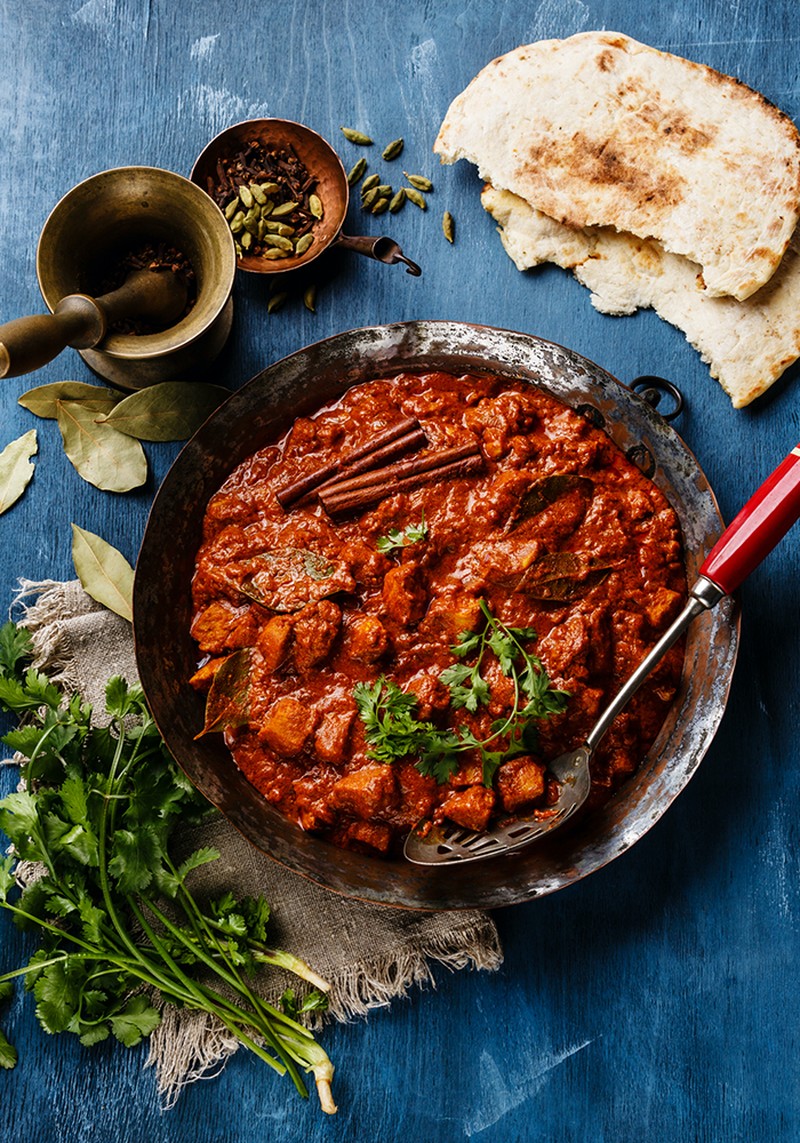
Laal Maans Lamb Curry
This traditional spicy lamb curry comes from the desert state of Rajasthan and has a pungent sauce, with aromas from all the whole spices and heat from the deep red Kashmiri chilli. It’s a must-try for anyone who loves Indian food.
Heat oil in a heavy based pot. Sear the lamb chunks and brown evenly in small batches and set aside in a bowl.
Add a little bit more oil to the pot, then add the whole masala and infuse in the oil for 1 minute over a moderate heat.
Now add the onions and a sprinkle of salt, brown the onions until caramelised this will take around ten minutes.
Once the onion is brown add the garlic and ginger and cook out for 2 minutes.
Add the ground spices and cook out on low heat with a splash of water for 2 minutes, then add the tomato purée and cook slowly for a further five minutes, adding a drop of water when the masala catches on your pan.
Once the oil has separated, add the seared lamb along with any juices in the bowl and coat with the masala. Cook the lamb in the masala for 10 minutes and then add enough boiling water to cover the meat. Simmer slowly for an hour or until the lamb is tender.
Adjust the seasoning to taste and serve.
Visit Opheem.com
DISCLAIMER: We endeavour to always credit the correct original source of every image we use. If you think a credit may be incorrect, please contact us at [email protected].
